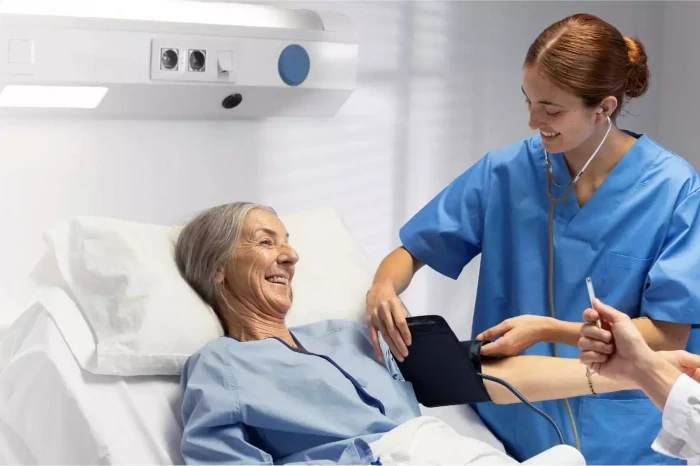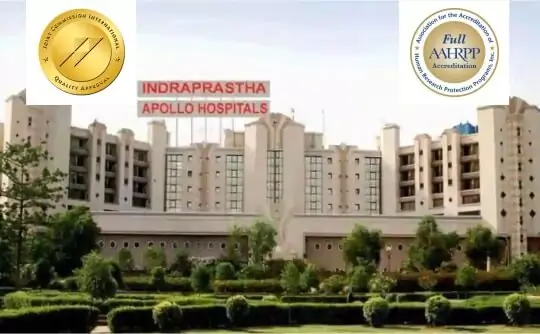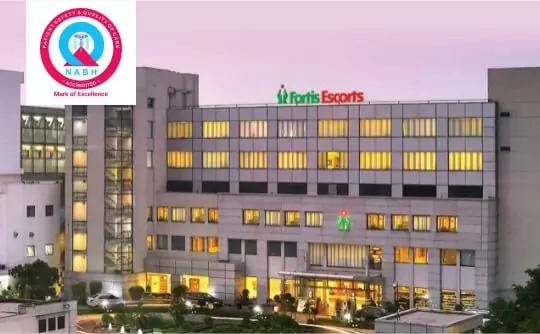

One of the key costs you will face when considering Atrial Septal Defect surgery in India is the cardiac surgeon's fee. IndiCure Health Tours connects you with most experienced cardiac surgeons in India who are highly skilled and have continually conducted successful heart surgeries. While the surgeon's fee can vary based on their experience, you can trust IndiCure to recommend surgeons who prioritize your safety and deliver excellent outcomes when you choose heart surgery in India.
In pursuit of enhancing patient care, novel techniques, and technologies are frequently integrated into the surgical procedure. These innovative enhancements in surgical methods may lead to elevated expenses for your atrial septal defect surgery cost in India.
Choosing an accredited surgical facility with skilled and qualified medical staff is crucial for the success of atrial septal defect surgery. Larger cities In India typically offer superior medical facilities and have more experienced surgeons, resulting in higher costs as compared to smaller cities in India. IndiCure Health Tours chooses to associate only with surgical facilities in larger cities of India in order to prioritize quality of healthcare and ensure patient safety.
Surgery-related costs for Atrial Septal Defect surgery in India encompass both pre-and post-operative expenses. Pre-operative costs are influenced by factors such as the patient's age and medical condition, determining the necessity and type of investigations needed. Post-operative expenses may involve prescribed medications and subsequent follow-up appointments.
At IndiCure, we consolidate most of the expenses for your Atrial Septal Defect Surgery Cost in India to provide you with an inclusive and cost-effective package tailored to your budget and individual requirements. After receiving medical reports, your case manager will provide an estimated surgery cost based on a discussion with the heart surgeon.
The final Atrial Septal Defect surgery cost in India can however be confirmed after your face-to-face consultation with the heart surgeon.

We Help you Choose the Right Treatment, Surgeon & Hospital

We Arrange Video/Telephonic Consultation with the Surgeon

We Assist you with Visa & Accommodation

We Receive you at the Airport and Drop you at Hotel/Hospital

We Assist you the at Hospital & Provide Post Operative Support
We work for hospitals and get you the discounted rates. You get the best value and save money on your medical trip to India.

Here is a set of questions you should consider asking before commencing your journey for Atrial Septal Defect surgery in India.
A hole in the septum, the muscle wall that separates the heart's two upper chambers, is known as an atrial septal defect (ASD) (atria). An ASD is a congenital defect that occurs when the septum does not form properly and is present at birth. It's referred to as a "hole in the heart."
Atrial septal abnormalities are the third most common congenital cardiac abnormality in children, and the most prevalent in adults. Women are more likely than men to get the illness.
A secundum ASD is a hole in the septum's center. Blood can flow from one side of the atria to the other through the hole. The direction is determined by the amount of pressure in the atria.
Because they do not exhibit symptoms, many people are unaware that they have an ASD. When a chest X-ray for another illness reveals that the right side of the heart is larger than normal, some patients learn about the defect. After minor exertion or exercise, an ASD might induce symptoms such as shortness of breath, fainting, abnormal heart rhythms, or exhaustion by the age of 50.
Treatment isn't usually required for a septal defect. If the hole is small and isn't producing any major symptoms or affecting the child's quality of life, it can simply be watched over time. As a child grows, septal abnormalities may close on their own.
Surgery may be recommended if a hole does not close on its own within the first two years of a child's life or if the hole is greater than 8-10mm. Damage to the lungs can be long-term if huge holes aren't closed.
Transcatheter correction and open-heart surgery are the two most used techniques for septal defects.
For adults and children, surgery involves sewing closed or patching the abnormal opening between the atria.
While the heart is momentarily halted, the surgeon makes an incision in the breastbone to reach the heart, and the patient is placed on a cardiopulmonary bypass machine, which pumps blood to the body while bypassing the heart and lungs except for the coronary arteries. To access the defect, an incision is created in the right atrium of the heart.
The patch is then meticulously stitched onto the opening in the septum. This stitching process involves either utilizing the patient's pericardial tissue or employing a synthetic graft. This approach aims to seal the hole in the septum, promoting optimal healing and functionality of the cardiac structures.
Sutures are used to close the heart, and the cardiopulmonary bypass machine is turned off. Temporary pacing wires are placed on the heart to prevent irregular cardiac rhythms after the operation. After the surgery, chest tubes are implanted to collect any remaining blood or fluid in the chest, and the skin is healed with stitches or staples.
After surgery, patients are taken to the intensive care unit and monitored. Pain is likely, and pain medication is given as appropriate. Patients also are on a respirator and have a breathing tube for the first few hours after surgery.
The length of the hospital stay depends on how quickly a patient recovers and can perform some physical activity.
The outlook after ASD surgery is excellent. Most children only need one surgery to correct a septal defect. The patch can stay in place for the rest of the child's life.
The benefits of septal defect repair become apparent almost soon after surgery. If the newborns are having feeding difficulties, they will feed significantly better after surgery. They are more prone to gaining weight. If a child's activity level was low prior to surgery, it is frequently significantly higher thereafter.

New Delhi
Indraprastha Apollo Hospitals, New Delhi is a state of the art multi speciality tertiary-care hospital situated in the most posh area of South Delhi. Considered to be the flagship hospital of Apollo group, Indraprastha Apollo Hospital is one of the important landmarks not only in Delhi, but in the world map because of its popularity among the medical tourists. The hospital has been one of the most sought after medical institutions for patients from Asia Pacific and beyond.

New Delhi
Fortis Escorts Heart Institute and Research Centre is one of the most revered medical institutions not only in India, but the entire world. The institute has set benchmarks in cardiac care with path-breaking work over the last 25 plus years. The hospital has the most advanced technology and has seen the best outcomes even in the most complex cardiac cases; be it cardiac surgery, Interventional Cardiology, Pediatric Cardiology, Pediatric Cardiac Surgery or Non-invasive Cardiology
Several patients have been known to live for 80 years or longer with massive unrepaired flaws without experiencing serious handicap. However, it is anticipated that atrial septal defect affects life expectancy in the majority of cases, with the average age at death not exceeding 50 years.
Most congenital heart problems are caused by a mix of genetics and conditions involving the mother during pregnancy, such as alcohol and drug use, as well as disorders including diabetes, lupus, and rubella. Specific genetic abnormalities are responsible for about 10% of congenital heart defects.
Small holes in the atrial septum may close on their own. Larger atrial septum abnormalities, as well as those that cause symptoms, can be repaired. The majority of children who have had their atrial septal defect repaired go on to live healthy lives.
Even if a child does not exhibit symptoms, healthcare providers frequently propose a repair for children with a big ASD. It can protect the lungs from long-term, irreversible damage. The procedure is most frequently performed on youngsters. However, if an adult's ASD was not diagnosed during childhood, this sort of correction may be required.
Both Atrial Septal Defect and Patent Foramen Ovale are congenital disorders affecting the septal tissue that connects the heart's left and right atria. ASD is a congenital heart defect caused by the failure of septal tissue to grow between the atria, whereas PFO occurs after birth when the Foramen Ovale, a flap-like valve, fails to close. Because an ASD hole is larger than a PFO, it is more likely to cause symptoms.
A percutaneous closure device is a customized device that is used to correct atrial septal defect and patent foramen ovale in patients (PFO). This device is affixed at the end of a catheter that is put through a vein in the leg and released at the defect site to close the hole during a catheterization procedure.
Apart from the surgical cost for Atrial Septal Defect surgery in India, there are additional expenses to consider when planning your medical trip to India. This includes budgeting for meals, airfare costs which will vary depending on your location of origin and the time of booking, and ground transportation expenses, such as taxi fares or rental car costs. Lastly, accommodation costs during your recovery period are important to consider, whether you opt for a hotel near the medical facility or other lodging options that suit your preferences and budget.
By carefully considering these additional expenses alongside Atrial Septal Defect surgery cost in India, you can better plan and budget for your trip to India, ensuring a smooth and comfortable experience during your recovery process.
The Atrial Septal Defect surgery cost in India is significantly lower compared to Western countries, without compromising on quality of care. This can be attributed to various factors, including the overall lower cost of living in India and a favorable exchange rate for international patients.
As a result, many patients from around the world opt to travel to India for Atrial Septal Defect surgery and other medical procedures, taking advantage of the cost savings without compromising on the quality of care received.
Enhance your medical journey to India by availing these extra services.
Traveling abroad for medical reasons may be challenging. With our experience of over a decade and working with the best surgeons and top hospitals in India, we help make your medical tour easier and safer for you. We will guide you at every step of the way and make end-to-end arrangements for your surgery, travel, and stay.
Ramandeep Dhaliwal
I had great experience having rhinoplasty through Indicure. Dr. Ruchika from Indicure has helped me in finding best plastic surgeon, answering all my questions...
Read More
Joshua Archer
My name is Joshua Archer I'm from New Zealand, bay of plenty, kawerau I opted for the bypass surgery in January 2023 but planned it in advance for 28 September found IndiCure...
Read More
Kera Ren
Absolutely loved my experience with IndiCure - from first inquiring to meeting the surgeon pre op to my follow up post op. The surgeon was extremely approachable...
Read More
Andreana Paul
Had a wonderful experience. Visited India for my plastic surgery. From sending mails, airport pickup, comfortable accommodation and, to smooth hospital appointment booking...
Read More
Brandi Luce
I had the privilege of using Indicure's services for a cosmetic procedure that I had wanted for a long time but had always been apprehensive about. Ruchika helped me...
Read More
Jade M
Indicure Health Tours went above and beyond my expectations. They helped me with every aspect of my journey and were professional, kind and caring. I was...
Read More
The content on the website (www.indicure.com) is intended to be general information and is provided only as a service. All photographs on our website of before and after results are examples only, and do not constitute an implied or any other kind of certainty for the result of surgery.
Learn about IndiCure Health Tours' comprehensive editorial policy that strives to deliver trustworthy, helpful, relevant, accurate and people-first content on medical tourism in India.
It is not medical advice and should not be taken as medical advice. It should not be used to diagnose or treat a health condition and is in no way meant to be a substitute for professional medical care. You are advised to see a surgeon in person to assess what surgery may or may not accomplish for you.
It is also important to keep your expectations realistic and to understand that all surgical procedures carry risks and should never be taken lightly.